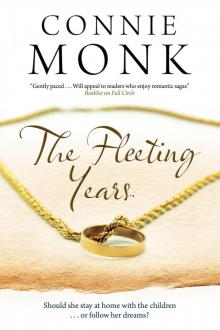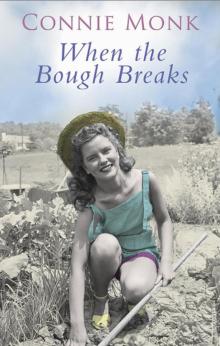- Home
- Connie Monk
Full Circle
Full Circle Read online
Table of Contents
Cover
Further Titles by Connie Monk
Title Page
Copyright
Chapter One
Chapter Two
Chapter Three
Chapter Four
Chapter Five
Chapter Six
Chapter Seven
Chapter Eight
Chapter Nine
Chapter Ten
Further Titles by Connie Monk
SEASON OF CHANGE
FORTUNE’S DAUGHTER
JESSICA
HANNAH’S WHARF
RACHEL’S WAY
REACH FOR THE DREAM
TOMORROW’S MEMORIES
A FIELD OF BRIGHT LAUGHTER
FLAME OF COURAGE
THE APPLE ORCHARDS
BEYOND DOWNING WOOD
THE RUNNING TIDE
FAMILY REUNIONS
ON THE WINGS OF THE STORM
WATER’S EDGE
DIFFERENT LIVES
THE SANDS OF TIME
SOMETHING OLD, SOMETHING NEW
FROM THIS DAY FORWARD
ECHO OF TRUTH
MISTRESS OF MANNINGTOR
FAST FLOWS THE STREAM
THE LONG ROAD HOME
TO LIGHT A CANDLE
A SECOND SPRING
HUNTERS’ LODGE *
A PROMISE FULFILLED *
BEYOND THE SHORE *
WHEN THE BOUGH BREAKS *
THE HEALING STREAM *
FULL CIRCLE *
* available from Severn House
FULL CIRCLE
Connie Monk
This ebook is copyright material and must not be copied, reproduced, transferred, distributed, leased, licensed or publicly performed or used in any way except as specifically permitted in writing by the publishers, as allowed under the terms and conditions under which it was purchased or as strictly permitted by applicable copyright law. Any unauthorised distribution or use of this text may be a direct infringement of the author’s and publisher’s rights and those responsible may be liable in law accordingly.
First published in Great Britain 2013 by
SEVERN HOUSE PUBLISHERS LTD of
9–15 High Street, Sutton, Surrey, England, SM1 1DF.
First published in the USA 2014 by
SEVERN HOUSE PUBLISHERS of
110 East 59th Street, New York, N.Y. 10022
eBook edition first published in 2014 by Severn House Digital an imprint of Severn House Publishers Limited
Copyright © 2013 by Connie Monk.
The right of Connie Monk to be identified as the author of this work has been asserted in accordance with the Copyright, Designs & Patents Act 1988.
British Library Cataloguing in Publication Data
Monk, Connie
Full circle : love and friendship in the 1950’s.
1. Women accountants–Fiction. 2. Female friendship–
Fiction. 3. Triangles (Interpersonal relations)–Fiction.
I. Title
823.9′14-dc23
ISBN-13: 978-0-7278-8345-2 (cased)
ISBN-13: 978-1-78010-486-7 (ePub)
Except where actual historical events and characters are being described for the storyline of this novel, all situations in this publication are fictitious and any resemblance to living persons is purely coincidental.
This ebook produced by
Palimpsest Book Production Limited,
Falkirk, Stirlingshire, Scotland.
One
1957
Whatever Louisa had expected when she read the letter from the firm of solicitors regarding the death of her aunt Violet Harding, it certainly hadn’t been this. ‘All that I possess I leave to my niece, Louisa Ann Harding.’
‘But I didn’t even know her.’ She spoke her thoughts aloud. ‘I only met her once and that was years ago, before I even started school. Are you sure she didn’t make a more up-to-date will?’
‘Perfectly certain. I didn’t know your aunt personally – she usually dealt with Mr Hayward, our senior partner – but, unfortunately, he is indisposed. Of course, there will be things to attend to before her affairs are finalized and you are in possession. There is the house in Lexleigh—’
‘House? You mean the landlord will hold me to giving notice? Surely her death must automatically terminate any agreement.’ Louisa took it for granted that her spinster aunt must have lived in rented property, for what sort of work could she have done to earn her the money for anything else?
‘There is no landlord. We hold the deeds of the property here and have done since she became the owner in nineteen thirty-one, twenty-six years ago. See, I have all the papers relating to Miss Harding here.’
‘Do you know how she died? Was she ill a long time?’ Then, speaking out of character but knowing it was the only way to make him understand, ‘You see, she was estranged from my father – her brother. They’d had nothing to do with each other for years.’
‘Ah, I see. So you aren’t aware of the accident. Miss Harding was returning from a trip to London when she was knocked down by a fast travelling car. Her death was instantaneous, I believe. The young driver is in trouble.’
‘Was she alone or was anyone else hurt?’
‘Quite alone. She lived alone too, so I understand.’
‘How dreadful that she had no one to leave her things to except a niece who was only four when she last saw her. I can’t even remember her clearly.’
Earlier in the week the letter from Hayward, Knight and Gibbins had arrived, having been sent to the one-time family home in Reading and re-directed to her parents’ new address in north Cornwall before being put in a second envelope and posted on to her. She hadn’t thought then of her aunt’s brief visit so many years ago. Now, sitting in this dreary office facing the junior solicitor, she remembered the few hours of a sunny afternoon in June, 1931. She seemed to hear the echo of raised voices as she approached the house from the garden where she had been playing and clearly remembered the tight, knotted feeling in her tummy as she heard the unusual sound of her father’s voice raised in anger. Her parents had never quarrelled; in fact, neither had they ever actually laughed aloud, but to the four-year-old she had been at that time they had represented calm and stability. The appearance of this uninvited visitor, however, made strangers of them.
As she had turned from the closed door, meaning to retreat to her secret hiding place in the garden, her father had come out, slamming the door behind him and seeming not to see her as he’d brushed past her on his way back to work. Then the door had opened again and her mother had called her.
‘Come here, Louisa. This is your father’s sister, your aunt Violet. She has an hour or two to wait until she goes for her train and I shall be out this afternoon. You will have to look after her. Now I’m going up to get ready so I’ll say goodbye, Violet.’
‘And you won’t wish me well?’
‘I wish you what you deserve.’
‘You and Victor are happy; surely you can understand?’
All these years later Louisa remembered the cold expression on her mother’s face as she answered, ‘You ask me to condone your wickedness? Yes, Victor and I are happy; we are also decently joined in wedlock. You are no sister of his if you continue on the road you are making for yourself.’ And with that she had turned away and started up the stairs to get ready to go out.
Not understanding her mother’s crossly spoken words, Louisa had felt ashamed. How could they treat this lady so rudely? If she had behaved like that to a visitor she would have been sent to her room in disgrace. So she had smiled at this new-found aunt and held out her hand to draw her into the garden.
As the afternoon progressed she had wondered again and again how her pare
nts could have been so nasty to someone who was such fun. They had played wheelbarrows, and when she had demonstrated how she could turn somersaults her aunt had done just the same. That she was a proper grown-up lady was hard to believe, especially when she had performed a perfect cartwheel displaying the prettiest, laciest knickers Louisa had ever seen.
Yet despite being sure she would never forget those few hours of fun, as time went by the memory had receded further into the back of her mind. Only when the letter had come from the firm of solicitors had she realized how many years it had been since she’d spared a thought to the woman whose name was never mentioned in her parents’ home.
‘I take it you don’t know Lexleigh?’ the solicitor was saying. ‘It’s a small village some fifteen or so miles from Gloucester. There is a railway halt and as you come through the gate from the platform turn left. You’ll see the village street. Walk straight on and you’ll come to the house – a walk of less than half a mile. The Retreat; it’s on the right-hand side of the road facing a short terrace of cottages.’
‘I shan’t keep the house. My work is in Reading, so of course I shall put it on the market. But I must go and see what’s involved. I don’t know the district at all – can you advise me on an estate agent and, I suppose, house clearance people?’
She might have been surprised if she could have read his mind, for it was seldom his work brought him a client so attractive. Louisa Harding was a good-looking woman, her tailored skirt and jacket classical, her make-up immaculate, her hair well cut in the fashionable pageboy bob. Little did he guess that her faultlessly groomed appearance was a ploy to cover up her lack of confidence. The only child of parents who had been in their forties when they had married and with pregnancy no part of their plans for the future, she had definitely been a ‘mistake’. Nevertheless, her upbringing had been kind, if cheerless, with rules not made to be broken. At school she had been looked on as something of an oddity: clever and hard-working, but withdrawn. Only one of her classmates had broken through her barrier of reserve and that had been Jessica Wilmott, who had lived with her grandparents. Jessica had known without being told that Louisa could never invite a playmate to the house – she had known it because her own circumstances had been the same. And as they’d progressed to senior school and their peers talked and giggled about crushes on film stars, their lives had been very different. Saturdays had been spent on their bicycles with a packet of sandwiches and two coppers for a bottle of lemonade while they made plans for their future. Childish dreams carried them to far-flung places and, indeed, as the years had passed Jessica had carved a life away from Reading. Both girls had been hard-working and ambitious, and had gained their school certificates. At that point Louisa’s father had insisted she should leave school and find work locally, whereas Jessica had been allowed to stay on and matriculate so that she could go to university. A degree had led her to a teaching post, but those early plans couldn’t be forgotten. It was five years since she had made the decision of a lifetime and emigrated. In Australia she was living the adventure she had dreamed of. But the friendship remained just as important with half a world between them as it had been when they’d cycled the lanes of Berkshire.
Now, as the young solicitor wrote down the names of two estate agents and a house clearance firm, Louisa’s thoughts took a journey of their own. This evening, as soon as she got home to Reading, she would write to Jessica and tell her the news; in her mind the sentences were already forming.
‘I believe you’ll get all the help you need from these people.’ The words cut across her straying thoughts. ‘If I give you the key to The Retreat perhaps you’ll put it in the post to me when you get back to Reading or, better still, I’ll put my name on a label and tie it on and you can put it through the letterbox here if you have time on your way to the station.’
‘You’ve been very helpful. I’ll go and have a look at the house and whoever I decide to contact I’ll let you know.’
‘I’ll look forward to hearing from you. I’m confident you’ll have no trouble in selling the property.’
And so they parted. Dennis Huntley watched from his window as, on her ridiculously high heels, she walked effortlessly and fast in the direction of the railway station. Once away from the building she forgot the man who had given her such life-changing news. ‘All I possess I leave to my niece, Louisa Ann Harding.’ All Violet Harding had possessed wasn’t a mortgage, wasn’t an overdraft; it was a house, a motorcar and a surprising amount of money in the bank. But how? Surely if she’d done anything really outstanding, even though the family had fallen out with her, someone would have been interested enough to mention it.
Louisa was the only person to alight at Lexleigh Halt. The train hissed and puffed as though it objected to being slowed to a shuddering standstill in a cloud of steam. The moment she slammed the door closed it started forward again, leaving her alone on the platform. There had been something unreal about the whole day, but it was in those first seconds since arriving in Lexleigh that her change in circumstances came home to her. Instinctively she straightened her already straight shoulders, raised her chin, breathed the lingering sooty smell from the departing train in deeply and felt an unfamiliar sense of release. But release from what? She’d been a free agent for years, leaving home with no objection from her parents as soon as she’d earned enough to pay for a bedsit near where she worked. From there she had moved to a comfortable flat in a converted house in a good residential road. Here she was, a qualified accountant, thirty years of age and capable of earning a comfortable living, so where was the logic in this sudden excitement? The house would probably be a country cottage with no facilities, and the car years old and something she would have to pay to have removed. Aunt Violet was her father’s younger sister by almost ten years and he was seventy-five years old. But that could never have been a forty-year-old woman who had turned cartwheels on the lawn.
Her thoughts moving on those lines, she left the railway halt and started along the road, passing one or two cottages (yes, that would be the sort of place she had inherited) and then a few shops. It couldn’t be much further, so she crossed to the right-hand side of the road ready to look for the name on a gate. She could see a terrace of cottages on the left side but on the right was only one solid, detached building backing on to farmland. It must be further on than that.
But as she came level with the gate she saw on it the words ‘The Retreat’.
Any stranger watching her might have assumed she knew exactly where she was going, as she seemed to look neither right nor left as she opened the gate. But in fact she had noticed the movement of the curtains in the middle cottage opposite and knew her arrival was causing interest as she took the key out of her handbag and walked to the front door. She would have liked to have stood outside and looked at the house, but her natural show of assurance wouldn’t allow her to let anyone see her hesitate. So, just as if this was what she did every day of the week, she opened the front door and went inside.
It was already nearly four o’clock and at the end of March the days were short. Louisa stood in the hallway just inside the front door of the house that was hers, surprising herself that she desperately wanted to bring alive her memories of her aunt. But how could she when she was so far removed from the young child who had believed she would never forget the magic of the few hours they had been together? It was all so long ago that it was like looking at a life unconnected with the woman she had become. When had the will been written? Surely years ago; nothing had changed in Violet’s life in recent times, as far as she was aware. But how sad; how could such a vibrant woman have had no one closer than a niece she’d seen only once, more than a quarter of a century ago?
From room to room she went, increasingly surprised by what she saw. The sitting room was well furnished and comfortable, the kitchen obviously refurbished much more recently than the house had been built. Upstairs the bathroom told the same story. Perhaps Aunt Violet had won money on the f
ootball pools, for this house had been brought up to date with small regard to cost. Two of the three bedrooms weren’t fully furnished, but there was nothing inferior about the rugs or curtains. On opening a wardrobe Louisa found clothes that jogged her memory as she recalled those pretty knickers that had been given an airing as her aunt had turned her cartwheels. She wished she could remember her better, but all she knew was that she had been like someone out of a book, not quite real and different from all her mother’s friends. And the garments hanging in the wardrobe weren’t for a woman of her mother’s age; indeed, they were what she would wear herself. All that I possess I leave to my niece, Louisa Ann Harding. Could she really have been in her sixties?
The third bedroom looked out across the fields at the back of the house and here the bed was made up. This is where Violet must have slept the night before she was killed. Louisa sat on the edge of the bed and found herself taking the nightdress from its case, as if that would give her a clue to the woman who must have hung on to the memory of that magic afternoon. It was chiffon – delicate black chiffon with the lingering aroma of perfume. An inner voice warned her that she must watch the time; she was only here to inspect the state of the house and meant to catch the train back to the main line in Gloucester at quarter past six. Yes, this was a good room; she forced herself to see it as it might impress a perspective purchaser. It would fall to her to arrange for the furniture to be taken to an auction house so she must get some idea of what would be involved. Without a backward glance she left the bedroom and went back down the stairs. Allowing herself no time for daydreaming, it was Miss Louisa Harding, chartered accountant, who glanced around the ‘lived-in’ kitchen, the small workroom furnished with a table, three chairs, a bookcase and a treadle sewing machine. Violet must have had a well-paid job for her to maintain a house like this. If only it weren’t so far from Reading it would make a lovely retreat for weekends … The first stab of temptation. But, always sensible and practical, she trod it down. How still it was here, still and silent; the very atmosphere gave her a feeling of unreality. Then something happened, something she couldn’t explain even to herself. It was as if, just for a moment, she felt Violet’s presence close to her. Still there was no clear picture of her, but she was conscious just as she had been on that long ago afternoon of what at four years old she had thought of as magic. What she wasn’t prepared for was a strange sensation that in this one-eyed village, as she thought of it, she could break free. But that was nonsense; she hadn’t worked all these years to be pulled off track by the sentimental memories of a four-year-old. Think of the salary she earned; think of the security of being qualified to do the job she had chosen. Why had she chosen it? No, that was a question she couldn’t answer, for in truth she had drifted into it, having taken a job as a junior clerk in a firm of accountants where it hadn’t been in her nature to remain at everyone’s beck and call, making the tea and coffee, running errands, stamping the mail and taking it to the post office on the way home. She had been determined to climb the ladder. But where had it got her? Where could it ever get her? Was she to spend her life in that office with nothing better to see out of the window than a wall? Violet’s happy laugh echoed down the years.

 The Healing Stream
The Healing Stream The Fleeting Years
The Fleeting Years Full Circle
Full Circle When the Bough Breaks
When the Bough Breaks